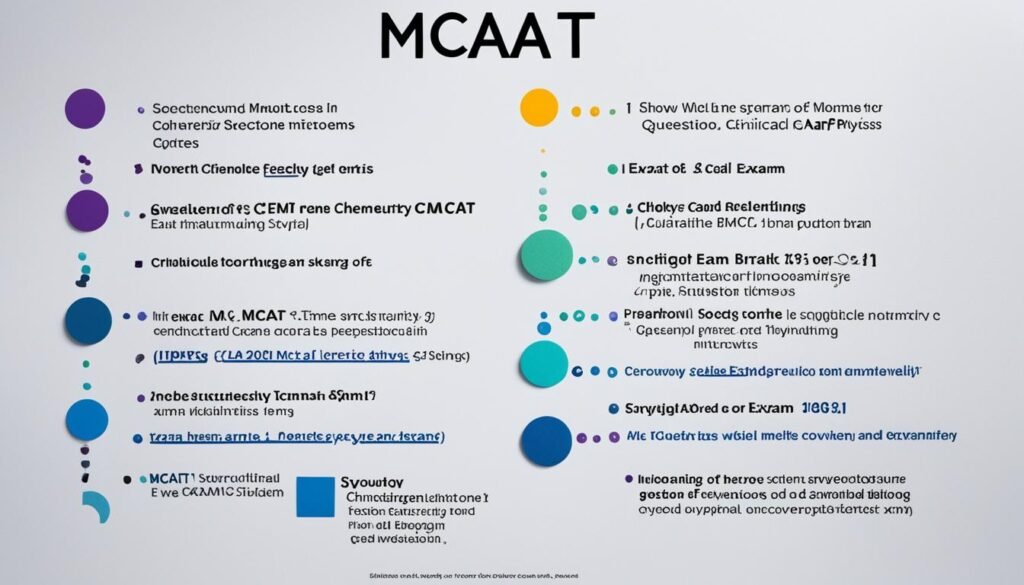The MCAT (Medical College Admission Test) is key for those aiming to join medical schools in the US and Canada. It’s a computer-based test with multiple-choice questions. This exam looks at your critical thinking, problem-solving, and science knowledge.
Also Read: Best Resources For GRE Exam Preparation
Key Takeaways
- The MCAT is a critical exam for medical school admission in the US and Canada.
- The test assesses an applicant’s critical thinking, problem-solving, and knowledge in various scientific disciplines.
- The MCAT is a computer-based, multiple-choice standardized test developed and administered by the AAMC.
- Understanding the format and structure of the MCAT is crucial for effective preparation and success in the medical school admissions process.
- Comprehensive preparation, including content knowledge, practice tests, and study resources, is key to performing well on the MCAT exam.
Introduction to the MCAT Exam
The MCAT (Medical College Admission Test) is a thorough and standardized test. It’s needed for getting into medical schools in the U.S. and Canada. The exam is set by the Association of American Medical Colleges (AAMC).
It helps medical schools assess how ready someone is for medical studies. Knowing this, let’s explore the MCAT in more depth.
Also Read: What Is The LSAT Exam And Why Is It Important?
Overview of the MCAT
The MCAT exam checks how well you can think critically, solve problems, and write. It also tests your understanding of science and how humans behave. These skills are key for doing well in medical school and your future as a doctor.
The test is taken on a computer and is made up of multiple-choice questions. You’ll see questions about biology, chemistry, psychology, and sociology, among others.
Importance of the MCAT for Medical School Admission
The MCAT matters a lot for getting into medical school. It gives admissions officers a fair way to judge an applicant’s readiness for medical training. A good MCAT score can really boost your chances of getting into the medical school you want.
So, preparing well for the MCAT is crucial. Next, we’ll look into what to expect on the test and how to aim for a high score.
MCAT Exam Sections
The MCAT exam has four main sections. Their goal is to check what you know and your skills in different areas. You’ll face topics like biology, chemistry, organic chemistry, biochemistry, psychology, and sociology. Plus, critical thinking is a big part of it.
Also Read: What Are The Key Sections Of The PTE Exam And How Are They Scored?
Biological and Biochemical Foundations of Living Systems
You’ll be tested on your knowledge of how living systems work. Areas covered include introductory biology, biochemistry, and the biochemical foundations of living systems.
Chemical and Physical Foundations of Biological Systems
This section is about the chemical and physical rules that affect living things. You’ll see questions from introductory chemistry and organic chemistry, and the physical foundations of biological systems.
Psychological, Social, and Biological Foundations of Behavior
It checks how well you understand what shapes human behavior. You’ll need to know stuff from introductory psychology and introductory sociology. Plus, the part played by biology in our actions is covered.
Critical Analysis and Reasoning Skills
This part is about looking at information and thinking critically about it. It checks how you understand and solve problems based on what you read. The focus is on your critical thinking and problem-solving skills including how you tackle questions, essays, or stories.
MCAT Exam Format

The MCAT exam is taken on a computer. It lasts about 7.5 hours, breaks included. It tests your knowledge, thinking skills, and how you solve problems. You’ll face questions in four key areas:
- Biological and Biochemical Foundations of Living Systems
- Chemical and Physical Foundations of Biological Systems
- Psychological, Social, and Biological Foundations of Behavior
- Critical Analysis and Reasoning Skills.
Also Read: Historical Evolution Of Legal Code Across Different Cultures
Test Duration and Structure
You’ll answer 230 multiple-choice questions in the MCAT. These are spread across four sections. The whole test takes about 7.5 hours, including breaks. So, you have time to rest and refocus during the exam.
Question Types and Scoring
The MCAT has two main question types: ones connected to passages and standalone questions. Passage questions use info from a text. Standalone questions check your direct knowledge of ideas. The MCAT scores each section from 118 to 132, with a total score between 472 and 528. The average scores are around 511.9 and 510.
| MCAT Section | Question Types | Time Limit | Section Score Range |
|---|---|---|---|
| Biological and Biochemical Foundations of Living Systems | Multiple-choice, passage-related and standalone | 95 minutes | 118–132 |
| Chemical and Physical Foundations of Biological Systems | Multiple-choice, passage-related and standalone | 95 minutes | 118–132 |
| Psychological, Social, and Biological Foundations of Behavior | Multiple-choice, passage-related and standalone | 95 minutes | 118–132 |
| Critical Analysis and Reasoning Skills | Multiple-choice, passage-related | 90 minutes | 118-132 |
Preparing for the MCAT Exam
Getting ready for the MCAT means fully understanding what is needed in each section. This includes all the necessary content knowledge and skills.
Also Read: The Role And Responsibilities Of Legal Counsel In Corporate Governance
Content Knowledge Required
The MCAT exam covers many areas of science. These include introductory biology, introductory chemistry, organic chemistry, biochemistry, introductory psychology, and introductory sociology. To do well, you must learn the basics of these topics. You also need to think critically and solve problems.
Practice Tests and Study Resources
Practice exams and study materials are key for the MCAT. They help students get familiar with the test’s setup and questions. Using practice tests and study guides is a good start.
Mcat tutoring and other mcat prep options are also very helpful. They offer specific advice for studying and improving your test-taking skills.
By spending time on mcat preparation and using many study resources, you’ll be ready. This work helps you get the knowledge and skills needed to do well. It also makes you a stronger candidate for medical school.
MCAT Score Interpretation

Figuring out MCAT scores is key to see how well a student might do in medical school or if they’ll get in. MCAT exam scores go from 472 to 528, with 511.9 as the middle score. Each section is scored from 118 to 132, with 125 being average for each area.
Understanding MCAT Scores
MCAT scores show how much a student knows and how ready they are for medical school. A high score means you’re well-prepared. When applying to medical school, these scores help admissions officers see how ready students are and if they might succeed.
Percentile Rankings and Competitiveness
The scores also show where a student stands compared to others. Being in the top 10% makes you a strong candidate. Top 25% or 50% is good too. But, below the 50th percentile, getting into medical school might be tougher.
| Percentile Ranking | MCAT Score Range | Level of Competitiveness |
|---|---|---|
| Top 10% | 518-528 | Highly Competitive |
| Top 25% | 513-517 | Highly Competitive |
| Top 50% | 508-512 | Competitive |
| Below 50th Percentile | 472-507 | Less Competitive |
It’s important to know what MCAT scores and percentiles mean. They guide us on how likely a student is to get into medical school.
Test Day Experience for the MCAT Exam
On MCAT exam day, applicants have a strict, timed test at a set testing center. First, they go through a detailed check-in where they show ID and learn the rules from the tutorial.
The MCAT exam aims to test your skills and knowledge within around 7.5 hours, with chances for breaks. Applicants see different question types, like passages and standalone ones, in the four sections.
Using electronic devices is not allowed during the MCAT exam. It’s vital to be on-time and prepared for the test.
When the exam ends, applicants offer feedback in a satisfaction survey. This info helps the Association of American Medical Colleges (AAMC) enhance the MCAT exam experience.
Knowing what to expect on test day helps applicants be confident and prepared, aiming for their best. This shows they’re ready for the challenges of medical school.
MCAT Registration and Test Dates

Understanding how to sign up for the MCAT is crucial for anyone applying to medical school. The AAMC manages the MCAT and has made registration easy to follow.
How to Register for the MCAT
When registering for the MCAT, start by making an account on the AAMC website. Then, find the MCAT registration section. During registration, pick your desired location, date, and time from the available choices. It’s smart to sign up early because spots can get filled fast, especially from January to September.
Upcoming MCAT Test Dates
The MCAT happens several times a year, with tests from January to September. For the latest test and score release dates, visit the AAMC website. Early registration helps you get your top choices for location, date, and time.
| Testing Year | Test Dates | Score Release |
|---|---|---|
| 2023 | January 19, February 4, March 31, April 15, May 20, June 17, July 22, August 19, September 9 | March 21, April 4, May 9, May 30, June 27, July 11, August 22, September 5, September 26 |
| 2024 | January 18, February 2, March 29, April 13, May 18, June 15, July 20, August 17, September 7 | March 19, April 2, May 7, June 4, June 25, July 9, August 20, September 3, September 24 |
Importance of MCAT Scores for Medical School Applications

The MCAT score is very important for getting into medical school. It shows how ready someone is for medical education. Admissions officers look at an applicant’s MCAT results with their academic record and other supporting materials. This helps them see if you would do well in a medical career.
Role of MCAT in Admissions Process
Admissions officers give a lot of weight to the MCAT score when they review an AMCAS application. Doing well on the MCAT can show you have the content knowledge and skills needed for medical school. MCAT scores are often used to compare applicants and see who might do well in the admissions process.
Balancing MCAT with Other Application Components
The MCAT isn’t the only thing that matters for admission. Admissions officers look at an applicant’s academic record, extracurricular activities, secondary essays, and more. It’s important to have a strong overall application. This means showing off not just your grades and test scores but also your personal qualities and interest in medicine.
Also Read: CTC Exams Prep: Your Pathway To Teaching Certification
Conclusion
The MCAT exam is essential for getting into medical school. It tests what you know and how well you can apply it. Understanding the MCAT format and why it’s important helps candidates prepare better.
To do well on the MCAT, you need to be strong in a few key areas. These include biology, chemistry, psychology, and critical thinking. Preparation is key. Using practice tests and study materials can really help.
The MCAT exam shows medical schools if you’re ready for their program. A good score can really make your application stand out. It’s your chance to prove you’re a serious candidate for medical school.
FAQs
Q: What is the MCAT exam and why is it important?
A: The MCAT exam, or Medical College Admission Test, is a standardized test required for admission to most medical schools in the United States and Canada. It assesses skills and knowledge deemed essential for success in medical school.
Q: How do I register to take the MCAT?
A: You can register for the MCAT exam through the AAMC website, where you will create an account, select a test date, and pay the registration fee.
Q: What is the average cost of taking the MCAT?
A: The cost to take the MCAT exam is currently around $320, although additional fees may apply for rescheduling or late registration.
Q: What are some tips for studying for the MCAT?
A: Some effective study methods for the MCAT include creating a study plan, using test prep materials such as practice exams and review books, and seeking help from tutors or study groups.
Q: When should I take the MCAT for med school applications?
A: It is recommended to take the MCAT exam at least one year before you plan to apply to medical school, as it takes time to receive and review your scores before submitting your applications.
Q: How does the MCAT exam play a role in applying to medical school?
A: The MCAT score is a critical component of medical school applications, alongside GPA, letters of recommendation, and personal statements. A strong MCAT score can greatly enhance your chances of acceptance.
Q: Is there a fee assistance program available for the MCAT?
A: Yes, the AAMC offers a Fee Assistance Program for eligible individuals, which can help reduce the cost of MCAT registration and other related fees for those in financial need.
Source Links
- https://students-residents.aamc.org/prepare-mcat-exam/whats-mcat-exam
- https://www.princetonreview.com/medical/mcat-sections
- https://www.kaptest.com/mcat/what-is-the-mcat





